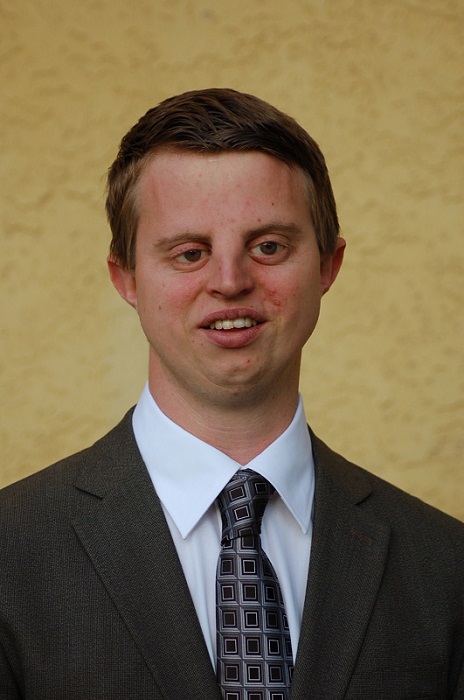 April 20, 2018 — Chemistry scholar Henry “Hoby” Wedler, Ph.D., stood in the East Room of the White House with four Secret Service agents in May 2012. He was taking a tour of 1600 Pennsylvania Ave., having just been recognized as a “Champion of Change” by then-President Barack Obama.
April 20, 2018 — Chemistry scholar Henry “Hoby” Wedler, Ph.D., stood in the East Room of the White House with four Secret Service agents in May 2012. He was taking a tour of 1600 Pennsylvania Ave., having just been recognized as a “Champion of Change” by then-President Barack Obama.
Wedler has been blind since birth, so he was listening to the guides describe the room when one of them said: “By the way, the President is right outside.”
Wedler waved. Obama was boarding Marine One and knew Wedler couldn’t see a thumbs-up or a wave, “so the President turned around on the lawn, came back and banged on the window of the East Room,” Wedler said.
The Presidential recognition for his work developing educational and employment opportunities for those with disabilities is just one memorable moment in Wedler’s life as a blind scientist, consultant and wine expert.
Wedler will speak to CSU Channel Islands (CSUCI) students and the general public on Wednesday, April 25 at 6 p.m. at Aliso Hall Room 150 on the CSUCI campus.
“Blind Innovation: The Art and Science of Chemistry and Universal Accessibility” is one of the spring series of Chemistry Distinguished Lectures. Usually the lectures are geared more toward chemists and other scientists, but Chemistry Program Chair Simone Aloisio, Ph.D., says this presentation is for everybody, especially considering one of Wedler’s specialties: wine tasting.
Wedler hosts “Tasting in the Dark” wine tours at the Francis Ford Coppola Winery in Geyserville, an experience that immerses blindfolded wine tasters in a vision-free sensory experience, which he says sharpens the other senses and deepen a person’s appreciation for wine.
“Life as a blind person might seem like it’s limiting, but to me, I feel like I’m always paying attention to my senses,” Wedler said. “I just have a deep understanding of the things that people are not getting in their surroundings. I get the smells and sounds and when people also describe those things to me, it’s such a rich experience.
Aloisio asked Wedler to speak at CSUCI because he’s intrigued with Wedler’s expertise in sensory science, or how flavor and aroma relate to science.
“He will explain how you can match something like a taste or a smell to a chemical or a group of chemicals,” “Aloisio said. “Or how the shape of a certain molecule makes it smell the way it does. We end up perceiving these different shapes as a taste or smell. One of the most powerful chemical sensors in existence is your nose.”
On the day Wedler was born in Petaluma, the doctors knew something was wrong with his sight. He had Microphthalmia, in which one eye did not fully develop and the other was very large. They were both removed and replaced with acrylic prosthetics.
“It never was a hurdle because I never had sight. It literally felt like the norm,” Wedler said. “I don’t need my eyesight to be successful, and if I had it, it would really be an annoyance.”
Wedler credits his parents with encouraging his innate curiosity, answering every one of the thousands of questions he asked about the world around him. Wedler’s mom had always been interested in teaching, so she became a teacher for the visually impaired, which helped her help Wedler.
Wedler developed an interest in chemistry in high school and went on to major in organic chemistry at University of California, Davis (UCD). He liked the idea of dealing with atoms because they are too small for anyone to see, only visualize.
“With organic chemistry, I get to think about everything in my mind and put images together and make sense of things, just the way I do as a blind person,” he said.
He excelled at the introductory winemaking course he took at UCD and when word of his sensory expertise got around, and one day in 2011, he got a call from director/winemaker Francis Ford Coppola.
“We co-innovated the idea of tasting in the dark,” he said. “He did this with me and let me run it and we had a great response.”
Wedler turned 30 this year, and is running his recently-founded Senspoint LLC, a sensory advising and education company that helps companies develop products with an eye for “sensory design,” the non-visual aspects of design.
He leads chemistry camp students with hands-on lab experiments using touch and smell for research, and is founder and director of Accessible Science, a non-profit organization devoted to making science accessible to everyone, regardless of disabilities
Wedler plans to speak at CSUCI about some light-duty technical chemistry as well as some projects in which being blind has been an asset for research.
“We’re also going to spend plenty of time talking about universal accessibility…making the world a place that can be accessible and available to everyone,” he said.
